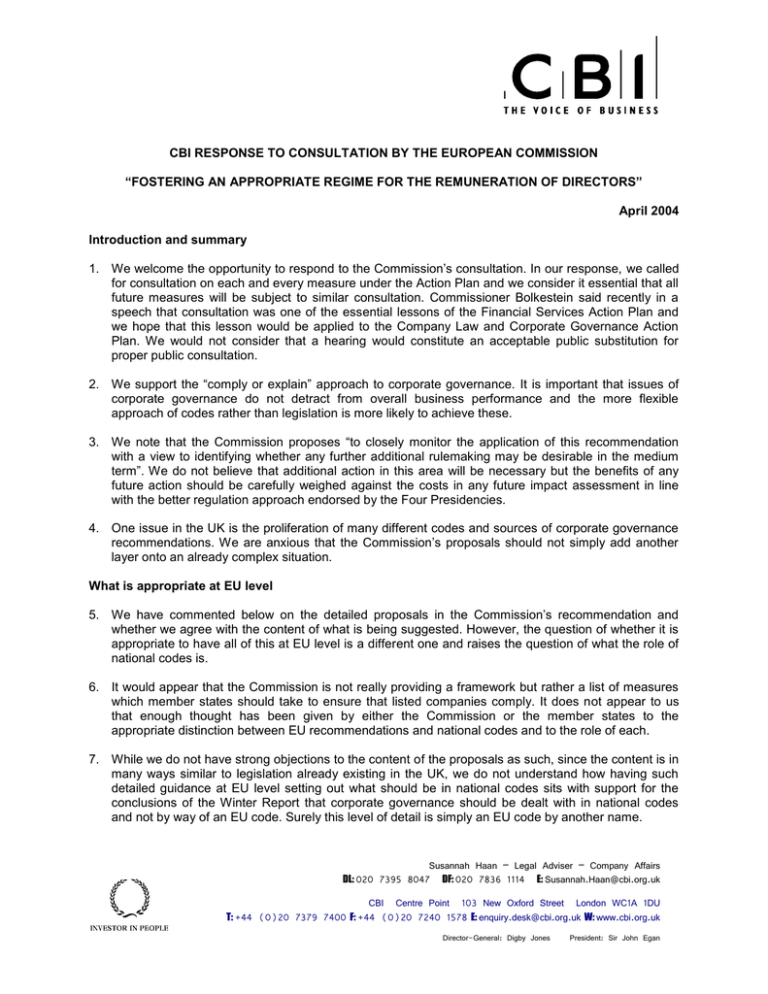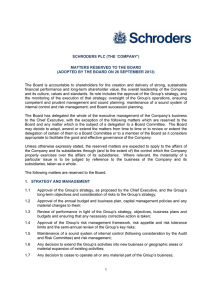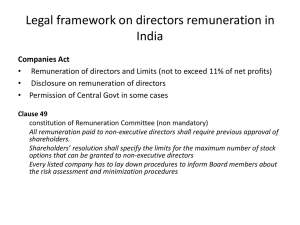Document 16003142
advertisement

CBI RESPONSE TO CONSULTATION BY THE EUROPEAN COMMISSION “FOSTERING AN APPROPRIATE REGIME FOR THE REMUNERATION OF DIRECTORS” April 2004 Introduction and summary 1. We welcome the opportunity to respond to the Commission’s consultation. In our response, we called for consultation on each and every measure under the Action Plan and we consider it essential that all future measures will be subject to similar consultation. Commissioner Bolkestein said recently in a speech that consultation was one of the essential lessons of the Financial Services Action Plan and we hope that this lesson would be applied to the Company Law and Corporate Governance Action Plan. We would not consider that a hearing would constitute an acceptable public substitution for proper public consultation. 2. We support the “comply or explain” approach to corporate governance. It is important that issues of corporate governance do not detract from overall business performance and the more flexible approach of codes rather than legislation is more likely to achieve these. 3. We note that the Commission proposes “to closely monitor the application of this recommendation with a view to identifying whether any further additional rulemaking may be desirable in the medium term”. We do not believe that additional action in this area will be necessary but the benefits of any future action should be carefully weighed against the costs in any future impact assessment in line with the better regulation approach endorsed by the Four Presidencies. 4. One issue in the UK is the proliferation of many different codes and sources of corporate governance recommendations. We are anxious that the Commission’s proposals should not simply add another layer onto an already complex situation. What is appropriate at EU level 5. We have commented below on the detailed proposals in the Commission’s recommendation and whether we agree with the content of what is being suggested. However, the question of whether it is appropriate to have all of this at EU level is a different one and raises the question of what the role of national codes is. 6. It would appear that the Commission is not really providing a framework but rather a list of measures which member states should take to ensure that listed companies comply. It does not appear to us that enough thought has been given by either the Commission or the member states to the appropriate distinction between EU recommendations and national codes and to the role of each. 7. While we do not have strong objections to the content of the proposals as such, since the content is in many ways similar to legislation already existing in the UK, we do not understand how having such detailed guidance at EU level setting out what should be in national codes sits with support for the conclusions of the Winter Report that corporate governance should be dealt with in national codes and not by way of an EU code. Surely this level of detail is simply an EU code by another name. Susannah Haan – Legal Adviser – Company Affairs DL: 020 7395 8047 DF: 020 7836 1114 E: Susannah.Haan@cbi.org.uk CBI Centre Point 103 New Oxford Street London WC1A 1DU T: +44 (0)20 7379 7400 F: +44 (0)20 7240 1578 E: enquiry.desk@cbi.org.uk W: www.cbi.org.uk Director-General: Digby Jones President: Sir John Egan 8. If the Commission proposes to continue with this level of detail for non-executive directors, we wonder what the role of the national codes and national bodies such as the UK’s Financial Reporting Council will be? 9. We do not believe that many companies are yet aware of the extent to which the detail of their own national codes is now to be set at EU level. This is important because the “comply or explain“ approach requires buy-in from companies. 10. The whole point of this approach is that they are enforced by investors i.e. by the market. There is thus no question of enforcement of such standards by regulators since companies can choose not to comply, but must then explain instead. If the market does not like the explanation, the share price will suffer. The “comply or explain” approach works because it is driven by the market, not by legislation. But in order for this to work, companies have to want to comply. They want to comply because in general they agree with the principles in the Code and only depart from them when they believe that circumstances justify this rather than as a matter of routine. The danger of imposing solutions on companies without proper consultation is that they feel no sense of “buy-in” and are therefore disinclined to comply. This could undermine the whole approach to corporate governance. 11. We would encourage the Commission to learn the lessons from the UK experience of the Higgs Review into the roles and responsibilities of non-executive directors, where part of the reaction to the Higgs Report was caused by concern that there would be no further opportunity for comment. We understand that the Commission is inclined not to consult over its proposed recommendation on nonexecutive directors and we would not consider this acceptable. We feel that failure to consult companies and directors on such an important question would alienate many of them from the Commission’s proposals, even if they did not have many disagreements with the content. 12. Although the UK has put directors’ remuneration onto a statutory footing, we believe that the EU approach should encourage the use of codes both here and in other areas of corporate governance. 13. We also believe that there is some confusion among some commentators about the differences between corporate governance, company law and CSR which is unhelpful. 14. In this context, we would wish to repeat our previous concerns about proposals for an EU Corporate Governance Forum. The essential principle of corporate governance is that it is based on best practice, and ultimately a matter of judgement for shareholders in respect of the companies in which they are invested. If shareholders do not like the company’s governance, they should try to resolve the situation by dialogue, change the management or sell their holdings. We have reservations about the proposed Forum without further clarification of its terms of reference. The current proposal that the EU should “actively co-ordinate the corporate governance efforts of Member States through their company laws, securities laws, listing rules, codes or otherwise” and that “co-ordination should not only extend to the making of these national codes, but also to the procedures Member States have in place to monitor and enforce compliance and disclosure” seems unacceptably broad and it is not clear to us what such a Forum could be expected to achieve. The concern is that any such Forum for corporate governance should be driven by issuers and investors and not by governments, regulators and other interested parties. 15. We would be happy to explain any of the points in this paper in more detail. Comments in response to the specific questions 4.1. Amount, composition and determination of the remuneration Do interested parties agree that the recommendation should not deal with the issues of the amount and structure of the directors’ remuneration? Yes. The amount and structure of the remuneration should be decided by the remuneration committee and the board in line with conditions appropriate to the size and complexity of company, the type of sector, etc. Shareholders should be able to have their say on whether the remuneration committee has performed adequately in the ways indicated below. We would point out that shareholders in the UK have already produced guidance on company remuneration in the form of ABI / NAPF guidance. The CBI has also produced some good practice guidance for companies in severance situations where a director is departing from the company. Thus the question of amount and structure is being dealt with elsewhere. 4.2. Recommendation to the Member States Do interested parties agree with the Commission that the recommendation should invite Member States to take the necessary regulatory measures to ensure that listed companies comply with all the provisions to foster an appropriate regime for directors’ remuneration? No. We strongly believe that the recommendation should invite Member States to have such provisions in their national codes. We do not believe that this should be a matter for regulation. The UK currently does have regulations in the form of the Directors’ Remuneration Regulation 2002. Companies are only now beginning to report under these regulations and so it is still early to draw many conclusions but the overall feeling is that the regulations are overly prescriptive and probably not as user friendly to investors as they might be. It therefore seems possible that some changes will be required in a year or two’s time once companies and investors have a year or two’s experience of the regulations. A code would be more flexible and easier to change as experience develops. We do not therefore believe that the UK system represents the optimal solution. 4.3. Scope – Listed companies Do interested parties share the view that the scope of the recommendation should cover EU listed companies as defined above or should it cover all EU companies? The recommendation should be limited to listed companies. There is no public policy reason for imposing standards on companies which are not open to the public as investors. While some may hold the view that some individual elements may be relevant to non-listed companies, we do not believe that a Commission recommendation is the place to address this. 4.4. Scope – definition of directors Do interested parties share the view that this recommendation should deal with the remuneration of the members of the administrative, managerial and supervisory bodies by reason of their responsibilities? We believe that the recommendation should apply in the UK to the members of the board whether executive or non-executive. As UK companies are not subject to two tier boards we do not comment on those. We would not agree that the recommendation should apply to senior managers below board level. Detailed proposals For the avoidance of doubt, these responses relate to what may be appropriate for listed companies only. They also relate to the question of whether we agree or disagree with the content of the proposals based on UK experience, rather than whether we consider that these are all appropriate for inclusion in a recommendation at EU level. As stated above, we are confused as to how detailed proposals in a recommendation are consistent with the Commission’s stated policy of support for national codes. 4.5. Disclosure of remuneration policy Do interested parties agree that the disclosure of remuneration policy should be forward looking (i.e. next financial year) and should contain at least the elements mentioned (below)? 4.5.1. General Information -related (or variable) components of remuneration. 4.5.2. Performance-related elements of remuneration- entitlement to shares or share options ce criteria on which any right to options, shares or other variable components of remuneration is based; performance linkage; e options or other incentives is not related to performance, an explanation of why this is the case; -financial benefits; 4.5.3. Pensions early retirement schemes for executive directors. 4.5.4. Contracts of contracts, and notice periods; er payments linked to early termination) under such contracts for executive directors. 4.5.5. Remuneration policy setting process -making process used for determining the company's remuneration policy for directors. We agree that the disclosure should be forward-looking rather than backward since the latter serves little purpose. However, we do not think that forward looking disclosure would work where short term incentives apply as this would not be practicable. We also think that an exclusion should be made from the requirement for companies to explain all circumstances, where a director can receive shares without this being performance-related, for directors’ involvement in Save As You Earn schemes, which are open to all employees. It also needs to be clear that disclosure should be of indicators rather than of confidential information e.g. companies would disclose the fact that a bonus is related to turnover but not the percentage. We also believe that the list should be indicative rather than prescriptive. This would allow the member states the flexibility to change as matters develop. Otherwise we do not see how this is not proposed to be an EU code by another name. See also introductory comments. Do they agree that such information should be a separate item on the AGM agenda? Yes, we agree that remuneration policy should be a separate item but not individual directors’ remuneration. And should there be a requirement for at least an advisory vote on the remuneration policy at the Annual General Meeting? We believe that it is right that suitable provision should be made for shareholders to express a view. Whether this is done by way of advisory vote or otherwise should be left to the member states to decide. In the UK it is done by way of advisory vote but this should be related to the national law of the member states. We would prefer that convergence in this area be promoted and not coercive. Shareholders may wish instead to express their views by way of vote on the re-election of chairman of the remuneration committee and it should be for them in dialogue with companies to decide what is best at national level. 4.6. Remuneration of individual directors Do interested parties consider that the disclosure of the remuneration of individual directors should include all financial and non-financial benefits as described (below)? 4.6.1. Salary and other fixed elements of remuneration or due to the director for the services performed under the preceding financial year; -cash benefits; ities. 4.6.2. Share options Detailed information should be required about the share options granted to each director. The right balance should nevertheless be struck between the relevance of the information and the need to avoid unnecessary detail. Information should in particular distinguish those options that have been exercised, those that have expired unexercised and those of which the terms and conditions have changed during the preceding financial year. Such information should at least include for each director: conditions; shares involved and the market price of the shares in relation to which it has been exercised; 4.6.3. Supplementary pension schemes For each person who has served as a director during the relevant financial year, the following information should be disclosed: -benefit scheme, changes in the director's accrued benefits under that scheme during the relevant financial year; -contribution scheme, details of the contributions paid or payable by the company in respect of that director during the relevant financial year. 4.6.4. Specific additional disclosure for non-executive and supervisory directors For non-executive directors or supervisory board members, the annual accounts should contain full and detailed information on the amount and structure of the remuneration of individual members including -related; -based schemes have been granted to non-executive or supervisory directors, a report on the reasons underlying the decision to grant such schemes to non-executive or supervisory directors. Yes, we agree that the factors above should be included. Share options should include Long Term Incentive Plans (LTIPs). Regarding the grant of share options to non-executives, we note that the Winter Report highlighted the fact that this may affect their independence. However, this should not apply to shares bought in the open market. Do they consider that other information related to individual directors’ remuneration should also be disclosed? No - we think that the above covers all relevant issues. 4.7. Role of shareholders' meeting Approval of the Annual General Meeting of Shareholders should be obtained at least for the following: -based schemes (including share options) to executive and non-executive directors; and the term within which options can be exercised; and in accordance with the law. Do interested parties agree that grants of share-based schemes to directors should be subject to the prior approval of the general meeting of shareholders and that relevant information on such schemes should be communicated to shareholders prior to the meeting? We agree that shareholder approval should be obtained for any share-based scheme, including options (as already required under the UK’s Listing Rules). However, we do not agree with the wording that shareholders should approve the "grant of share-based schemes (including share options) to executive and non-executive directors" - which seems to suggest that shareholders should approve the actual grant of individual options, rather than just the scheme under which options will later be granted to individuals, as we do not believe that individual grants should be subject to shareholder approval. This may be purely a drafting matter but needs to be clarified. Secondly, the proposal seems to be that shareholders should approve performance criteria. This is not currently required in the UK. Scheme rules leave these to the discretion of the board (remuneration committee) though in practice companies make sure that the criteria they intend to adopt are likely to be acceptable to shareholders by being sufficiently "stretching". UK companies are happy to tell shareholders what criteria they use, and then stick to them, but this is not strictly a matter for shareholder approval and they would still be within the scheme rules if they in fact used different criteria. 4.8. Recognition of stock options in the annual accounts The Commission proposes to consider how to deal with this last issue after the adoption of the relevant IAS. We note that the IASB has released its proposals on accounting for share options and that the US FASB has also released its draft standard. Although it may not be perfect, we would support EU endorsement of IFRS 2. CBI members support a single set of standards under IAS and, with the introduction of IFRS 2, do not see that there is the need for further Commission action in this area.






